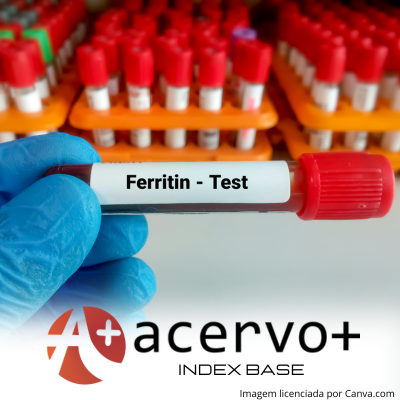Correlação entre obesidade e níveis séricos de ferritina
##plugins.themes.bootstrap3.article.main##
Resumo
Objetivo: Investigar a correlação entre os níveis séricos de ferritina e o índice de massa corporal (IMC) em pacientes obesos. Métodos: Estudo clínico, prospectivo, descritivo, tipo survey com abordagem analítica quantitativa. Foram analisados dados de 58 pacientes, com predominância do sexo feminino (65,5%) e idade média de 46,6 ± 14,1 anos. Resultados: Observou-se uma correlação positiva fraca entre IMC e ferritina (ρ = 0,387, p = 0,003). Ao estratificar a análise por sexo, observou-se uma correlação mais forte entre IMC e ferritina no sexo feminino (p= 0,3344, p=0,0401) em comparação com o sexo masculino (p=0,1263; p=0,5956), de modo que não houve significância no sexo masculino. Conclusão: Os resultados sugerem que a obesidade está associada a níveis elevados de ferritina sérica, possivelmente devido à inflamação crônica e alterações metabólicas. Essa relação pode ter implicações importantes para a avaliação do estado do ferro e risco de complicações em pacientes obesos, de modo que tal análise deve ser realizada de forma criteriosa.
##plugins.themes.bootstrap3.article.details##
Copyright © | Todos os direitos reservados.
A revista detém os direitos autorais exclusivos de publicação deste artigo nos termos da lei 9610/98.
Reprodução parcial
É livre o uso de partes do texto, figuras e questionário do artigo, sendo obrigatória a citação dos autores e revista.
Reprodução total
É expressamente proibida, devendo ser autorizada pela revista.
Referências
2. ANTUNA-PUENTE B, et al. Interleukins in adipose tissue: Keeping the balance. Revista Molecular and Cellular Endocrinology, 2022; 542: 111531.
3. AROSIO P, et al. Ferritin, cellular iron storage and regulation. Revista IUBMB Life, 2017; 69(6): 414-422.
4. BONFILS L, et al. Fasting serum levels of ferritin are associated with impaired pancreatic beta cell function and decreased insulin sensitivity: a population-based study. RevistaDiabetologia. 2015; 58(3): 523-33.
5. CAMASCHELLA C, et al. Iron metabolism and iron disorders revisited in the hepcidin era. RevistaHaematologica, 2020; 105(2): 260-272.
6. CHUNG SJ, et al. Sex-Specific Associations between Serum Ferritin and Osteosarcopenic Obesity in Adults Aged over 50 Years. Rev Nutrients, 2022; 14(19): 4023.
7. DIGNASS A, et al. Limitations of Serum Ferritin in Diagnosing Iron Deficiency in Inflammatory Conditions. Revista International Journal of Chronic Diseases, 2018; 2018: 9394060.
8. DIGNASS AU, et al. European consensus on the diagnosis and management of iron deficiency and anaemia in inflammatory bowel diseases. J Crohns Colitis, 2015; 9(3): 211-222.
9. DUAN F, et al. Deciphering endocrine function of adipose tissue and its significant influences in obesity-related diseases caused by its dysfunction. Rev Differentiation, 2025; 141: 100832.
10. ENGIN A. Reappraisal of Adipose Tissue Inflammation in Obesity. Revista Advances in Experimental Medicine and Biology, 2024; 1460: 297-327.
11. FONSECA O, et al. New Perspectives on Circulating Ferritin: Its Role in Health and Disease. Revista Molecules, 2023; 28(23): 7707.
12. GANZ T e NEMETH E. Iron homeostasis in host defence and inflammation. RevNature Reviews Immunology, 2015; 15(8): 500-510.
13. GKOUVATSOS K, et al. Regulation of iron transport and the role of transferrin. RevistaBiochimica et Biophysica Acta, 2012; 1820(3): 188-202.
14. GOZZELINO R e AROSIO P. Iron Homeostasis in Health and Disease. Revista International Journal of Molecular Sciences, 2016; 17(1): 130.
15. LEE HS, et al. Elevated Ferritin Levels Associated with High Body Fat Mass Affect Mortality in Peritoneal Dialysis Patients. Revista Nutrients, 2023; 15(9): 2149.
16. MĄCZKA K, et al. The Impact of the Endocrine and Immunological Function of Adipose Tissue on Reproduction in Women with Obesity. Revista International Journal of Molecular Sciences, 2024; 25(17): 9391.
17. MUÑOZ MP, et al. Transferrin Saturation, Serum Ferritin, and C-Reactive Protein vs. Serum Ferritin for an optimal Iron Deficiency Diagnosis in Candidates for Bariatric Surgery. Revista Obesity Surgery, 2024; 34(4): 1174-1184.
18. NEMETH E e GANZ T. The role of hepcidin in iron metabolism. Revista Acta Haematologica, 2009; 122(2-3): 78-86.
19. OMS. Obesity and overweight. WHO Fact Sheet, 2021.
20. PETROVIĆ S, et al. A Prospective Observational Study Analyzing the Diagnostic Value of Hepcidin-25 for Anemia in Patients with Inflammatory Bowel Diseases. Revista International Journal of Molecular Sciences, 2024; 25(7): 3564.
21. PICHÉ ME, et al. Obesity Phenotypes, Diabetes, and Cardiovascular Diseases. Revista Circulation Research, 2020; 126(11): 1477-1500.
22. RODRÍGUEZ-MORTERA R, et al. Higher Hepcidin Levels in Adolescents with Obesity Are Associated with Metabolic Syndrome, Dyslipidemia, and Visceral Fat. Revista Antioxidants, 2021; 10(5): 751.
23. RUSCITTI P, et al. Expanding the spectrum of the hyperferritinemic syndrome, from pathogenic mechanisms to clinical observations, and therapeutic implications. Revista Autoimmunity Reviews, 2022; 21(7): 103114.
24. SCHMIDT PJ. Regulation of Iron Metabolism by Hepcidin under Conditions of Inflammation. Revista The JournalofBiologicalChemistry, 2015; 290(31): 18975-18983.
25. SEMENOVA Y, et al. Iron-related Biomarkers in the Diagnosis and Management of Iron Disorders. Revista Current Medicinal Chemistry, 2024; 31(27): 4233-4248.
26. SIDDIQUE A, et al. Iron deficiency in patients with nonalcoholic fatty liver disease is associated with obesity, female gender, and low serum hepcidin. Revista Clinical Gastroenterology and Hepatology, 2014; 12(7): 1170-1178.
27. SUÁREZ-ORTEGÓN MF, et al. Both low and high body iron stores relate to metabolic syndrome in postmenopausal women: Findings from the VIKING Health Study-Shetland (VIKING I). European Journal of Clinical Investigation, 2024; 54(12): 14312.
28. TARANCON-DIEZ L, et al. Impact of obesity on iron metabolism and the effect of intravenous iron supplementation in obese patients with absolute iron deficiency. Revista Scientific Reports, 2025; 15(1): 1343.
29. TILG H, et al. Adipokines: masterminds of metabolic inflammation. Rev Nature Reviews Immunology, 2024.
30. ULLAH A, et al. Pro- and anti-inflammatory cytokines are the game-changers in childhood obesity-associated metabolic disorders (diabetes and non-alcoholic fatty liver diseases). Revista Reviews in Endocrine & Metabolic Disorders, 2024; 25(4): 783-803.
31. WANG W, et al. Serum ferritin: Past, present and future. Revista Biochimica et Biophysica Acta, 2010; 1800(8): 760-769.
32. YU PH, et al. Low serum iron is associated with anemia in CKD stage 1-4 patients with normal transferrin saturations. Revista Scientific Reports, 2021; 11(1): 8343.

